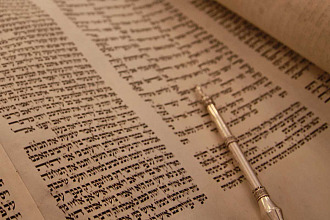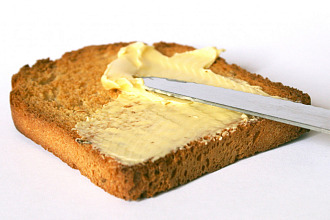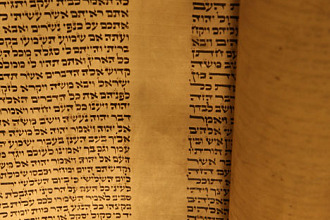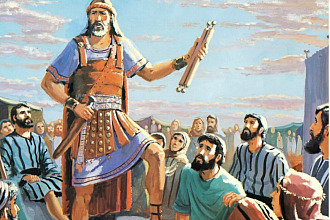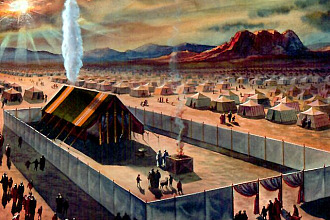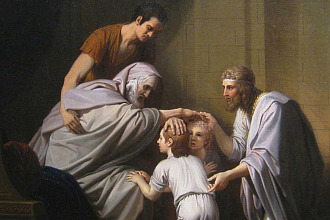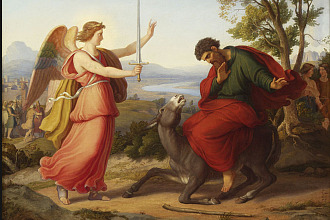Parasha for the Week: Shemot: Exodus 13:17 – 17:16
Haftarah for the Week: Judges 4:4 – 5:31
Besorat Yeshua: Mark 14:45 – 59
Overview
Pharaoh finally sends B'nei Yisrael out of Egypt. With pillars of cloud and fire, G-d leads them toward Eretz Yisrael on a circuitous route, avoiding the Philistines.
Pharaoh regrets the loss of so many slaves and chases the Israel with his army. Israelites are very afraid as the Egyptians draw close, but G-d protects them. Moshe raises his staff and G-d splits the sea, enabling the people of Israel to cross safely.
Pharaoh commands his army to pursue, whereupon the waters crash down upon the Egyptians.
Moshe and Miriam lead the men and women, respectively, in a song of thanks.
After three days' travel only to find bitter waters at Marah, the people complain. God, through Moshe, miraculously produces potable water.
The people complain that they ate better food in Egypt.
G-d sends quail for meat and provides manna, a miraculous bread that falls from the sky every day except Shabbat. On Friday a double portion descends to supply the Shabbat needs.
No one is able to obtain more than his daily portion, but manna collected on Friday suffices for two days so the Jews can rest on Shabbat.
Some manna is set aside as a memorial for future generations.
When we again complain about a lack of water, God miraculously produces water from a rock.
Then Amalek attacks. Joshua leads the Jews in battle while Moshe prays for their welfare.
"Be Grateful"
The Torah states: "And the Children of Israel came to Marah. And they were not able to drink the water at Marah for they were bitter." (Exodus 15:23) Why does the Torah use the word "they" were bitter rather than specifying "the waters were bitter"? The Kotzker Rebbe explains that "they were bitter" refers to the people themselves. When someone is bitter, then everything tastes bitter. To a bitter person nothing in life is positive. He makes himself miserable and those around him suffer. He thinks that he has valid reasons for his bitterness, but the source is within himself. Rabbi Packouz' lesson: Take responsibility for your own life! Work on seeing the positive - keep a running list of positive things you have to be grateful for from large to small and then prioritize them. This will focus you on the positive. Sweeten your outlook and you'll live in a much sweeter world!
"Trust in G-d "
The Torah states, "And they came to Eilim, and there were twelve springs of water, and seventy palm trees, and they encamped by the water" (Exodus 15:27). It is interesting to note that the Children of Israel came to Eilim from Marah where they rebelled over the bitter water. They were only one day in Marah; they spent twenty days of enjoying sweet, plentiful water at Eilim. What lesson can we learn from our history? Rabbi Yisrael Meir Kagan, comments that mortals have limited vision. Because we have limited visions we are full of complaints. We whine and fret about things not being as we wish. There is always something missing. If the Israelites would have been aware that they would soon have water in Eilim, they would not have come with their complaints to Moshe that they were missing water. They just had to be a bit more patient. If they had just waited, it would have turned out better than they imagined. If we can remain patient, work on trust in G-d and take action where we can, we won't suffer needlessly by assuming that we will suffer in the future."
"True Freedom"
The Torah states, "And on that day the Almighty saved the Israelites from the hand of Egypt" (Exodus 14:30). Which day does the Torah refer to when it writes "on that day" and what lesson can we learn from the reference to that day? The Ohr Hachayim comments that the Torah states that "on that day" that the Israelites were saved was the very same day that the Egyptians who pursued them perished in the sea. However, the Israelites were liberated from Egypt and left Egypt before this. Why only now that the Egyptians drowned in the sea did they feel saved? The answer: the Israelites only felt saved once they felt secure that the Egyptians would no longer pursue them. We see from this that even though in actuality a person is free, he is not really considered free unless he personally feels free. A person who worries and feels insecure is a person who is imprisoned even though he is not behind bars and no one will harm him. Rabbi Packouz affirms that to be truly free you must feel free and this is up to you. You have a great deal of control over your thoughts if you surrender them to God. If you worry about the future, even though future events might work out exactly as you would have wished, you still suffer in the present. This suffering will be the same as if you actually experienced some misfortune. However, all the suffering will be unnecessary. The greater your faith in God's love and provision for you and the more you surrender your negative thoughts to God, the greater freedom you will experience in life!
HAFTARAH: Judges 4:4 – 5:31
Haftarah: The text of the Haftara is about Debo¬rah one of the rare prophetess of the Bible: "At that time Deborah, a prophetess, wife of Lappidoth, was judging Israel." (Judges. 4:4).
Parasha: In the parasha we have the description of another prophetess, Miriam, Moses sister. Miriam was the first proph¬etess of Israel. God uses men and women to reveal his will to us.
Haftarah: Just as Miriam was a great support for Moses, Deborah supported Barak, the commander of the Israel army: "Then Deborah said to Barak, "Up! For this is the day on which the LORD has given Sisera into your hand. The LORD is indeed going out before you." So Barak went down from Mount Tabor with ten thousand warriors following him. And the LORD threw Sisera and all his chariots and all his army into a panic before Barak; Sisera got down from his chariot and fled away on foot." (Judges. 4:14-15).
Parasha: When Moses got his victory over the Egyptian army he sang a song with Miriam: Then Mo¬ses and the Israelites sang this song to the LORD: "I will sing to the LORD, for he has triumphed gloriously; horse and rider he has thrown into the sea (Ex. 15:1).
Haftarah: When Barak got his victory over the army of Sisera, he sang a song with Deborah: Then Deborah and Barak sang on that day, saying: "When locks are long in Israel, when the people offer themselves willingly— bless the LORD! (Judges 5:1-2) "Awake, awake, Deborah! Awake, awake, utter a song! Arise, Barak, lead away your captives. (Judg. 5:12)
Besorat Yeshua Luke 2:25 - 38
Besorah: Just as the Torah portion and the Hafarah portions speak of God using a prophet and a prophetess to sing of God's salvation, so also does our Besorat Yeshua. Eight days after Y'shua was born He was brought to the temple for his circumcision and dedication. "behold, there was a man in Jerusalem whose name was Simeon, and this man was just and devout, waiting for the Consolation of Israel, and the Holy Spirit was upon him. And it had been revealed to him by the Holy Spirit that he would not see death before he had seen the Lord's Messiah. ...He took Him (Y'shua) up in his arms and blessed God and said: 'Lord, now You are letting Your servant depart in peace, According to Your word; For my eyes have seen Your salvation which You have prepared before the face of all peoples, A light to bring revelation to the Gentiles, and the glory of Your people Israel.' Joseph and His mother (Miriam) marveled at those things which were spoken of Him. Anna, a prophetess, ...was of great age, ...served God with fastings and prayers night and day. Coming in that instant she gave thanks to the Lord, and spoke of Him to all those who looked for redemption in Jerusalem." Luke 2:25-38


